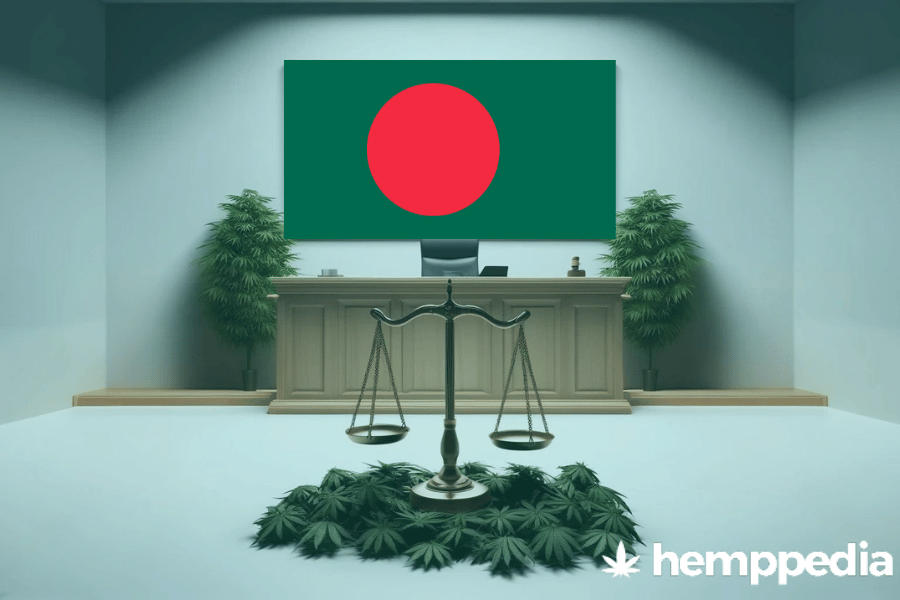TL;DR
In Bangladesh, the production, selling, and consumption of cannabis is currently illegal. Cannabis is classified under the Narcotics Control Act of 1990 as a ‘Class A’ substance, the category reserved for dangerous narcotics. Medical usage, recreational usage, and CBD are all illegal. The table below provides a brief overview:
| Recreational Use | Medical Use | |
|---|---|---|
| THC | Illegal | Illegal |
| CBD | Illegal | Illegal |
Introduction
Unlike many other countries around the world, Bangladesh is currently maintaining a hardline stance against the legalization, decriminalization, or controlled use of cannabis. As the global trend shifts towards more relaxed regulations around cannabis use, it’s worth exploring the current legislation and context within Bangladesh itself.
Overview of Cannabis Legislation
Key Terms
- Legalization: The process of removing all legal prohibitions against it.
- Decriminalization: The abolishment of criminal penalties, though cannabis remains illegal.
- Medical Use: The use of cannabis prescribed by a registered medical practitioner for treating specific health conditions.
- Recreational Use: The personal consumption of cannabis for non-medical purposes.
In Bangladesh, all aspects mentioned above are illegal. However, across the globe, certain nations and states have various regulations ranging from full prohibition to full legalization.
The Legal Status in Bangladesh
Legal Status
In Bangladesh, cannabis falls under the Narcotics Control Act, 1990, and is classified as a ‘Class A’ substance which signifies it as a dangerous narcotic. It is illegal for recreational and medical use. Details can be found here.
Historical Context
Traditionally, cannabis-based products like ‘bhang’ and ‘ganja’ were used in Bangladesh, consumed for medicinal and spiritual use. It was only in the 1980s when heavier restrictions came into place matching with the global “War on Drugs”. The Narcotics Control Act was signed in 1990, leading to the current legal landscape.
Possession and Use
Possession, consumption, and distribution of cannabis are considered illegal activities in Bangladesh. There are no stipulations regarding where it can be consumed as it is completely prohibited. The age restriction is not applicable as it is illegal irrespective of age.
Cultivation and Distribution
The cultivation of cannabis for personal or commercial use is also illegal in Bangladesh. Cannabis must not be sold or distributed in any form.
Enforcement and Penalties
According to the Narcotics Control Act, 1990, the penalties for cannabis-related offenses can be severe, including imprisonment and fines. More details can be found here.
Medical Cannabis
Cannabis has not been recognized for medical usage in Bangladesh. There are no processes in place for obtaining medical cannabis, as it is illegal.
Social and Economic Impact
As cannabis remains illegal in the country, there are no official studies on the potential social and economic impacts of legalization or decriminalization in Bangladesh.
Comparative Analysis
Looking at the global landscape, some countries like Canada and certain states in the U.S. have moved towards full legalization, while others, like Bangladesh, remain firmly against any form of cannabis use.
Future Outlook and Ongoing Debates
Currently there are no clear signs of any upcoming legislation changes regarding cannabis in Bangladesh. Public opinion remains divided, and activism related to cannabis law reform is limited.
Conclusion
As it currently stands, Bangladesh has strict laws against the use, possession, and distribution of cannabis. Unlike the trend in certain parts of the world towards decriminalization and regulated use, Bangladesh maintains stringent control. Given the complexities of the issue, however, the future of cannabis legislation in the country remains to be seen.





